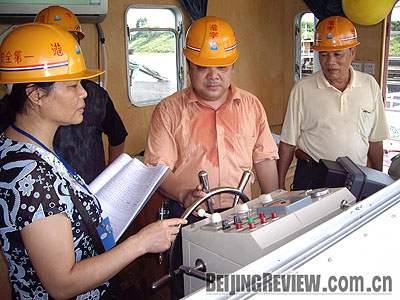|

Despite being the boss and founder of a shipping group, 43-year-old Mai Jiawei maintains low profile. His group is enormous, with 58 ships, a total shipping capacity of 53,000 tons, and plans to develop in overseas markets, but his background keeps him well grounded.
"I would be nothing if it hadn't been for my country's reform and opening up," said the humble entrepreneur.
Mai's life is a rags-to-riches story that began as the oldest son of five children in a family that lived by fishing in the Shizui Township of Guigang in Guangxi Zhuang Autonomous Region.
During his childhood when China was under a planned economic system, Mai's parents worked at collectively owned water transportation cooperative. They had to work hard to feed five mouths, and the family often went hungry.
"The hard work of my parents failed to bring us a well-off life," said Mai, noting that his tough upbringing did prepare him for the rough and tumble of the business world.
In the early 1980s, when reform and opening up had just begun, the water transportation cooperative in Mai's hometown underwent market-oriented economic reform, allowing private purchasing and contracted vessels to run shipping businesses.
Mai's family asked for a loan from the local bank and borrowed some from relatives to buy a 12,000-yuan ($1,714) 24-horsepower wooden boat with a 50-ton capacity.
It was big money to spend, and the purchase confused many people as there was little shipping work at the time, and iron vessels were becoming more popular.
"We acted on impulse to buy that boat," said Mai.
The family went into business transporting agricultural produce over short distances. There was little of this kind of work and fierce competition, so they would accept any job no matter how low the price was.
"At first it was so hard. The whole family had to wake up so early and finish work late to try to make more profits to reclaim the cost of the boat and rise out of poverty," Mai recalled. Initially Mai did not know how to steer the boat and was just a laborer doing odd jobs. Later he learned how to operate it in order to save the cost of hiring a professional driver.
Fortunately for Mai and his family, as China's economy advanced the water transportation business did too. Mai began operating a long-distance service, taking local food, hardware, textiles and chemical products to the busy harbor city of Wuzhou. Within two years he was relatively wealthy and had gained priceless experience.
In 1989, the river in Mai's hometown was expanded and he seized the opportunity, pouring all of the family's savings into buying a 250-ton-capacity steel ship, which he used to transport bagasse to Guigang for making paper.
In 1998, when the water channels were further upgraded, Mai realized it was a golden chance and a major turning point in his career.
A year later he set up a private enterprise in Guigang with registered capital of 12 million yuan ($1.7 million). Mai's company ordered six ships each with a capacity of 1,200 tons. As his business grew, Mai's ships began to expand their field of operation into more distant provinces and regions, including Hong Kong and Macao.
In recent years several giant corporations, including China Huadian Corp., one of the five largest state-owned power-generation enterprises in China, relocated to Guigang. Aiming at a new industry, Mai remodeled his ships into standard vessels for transporting cement equipment, and his business shifted from corn and beans to cement, coal and steel.
In a decade of expansion, Mai's firm had become a shipping force, and he had personally grown from laborer to shipping magnate.
Guangxi is now playing an increasingly important role in the China-ASEAN Free Trade Area, and Mai is considering a new target: setting foot in the overseas shipping market. | 
